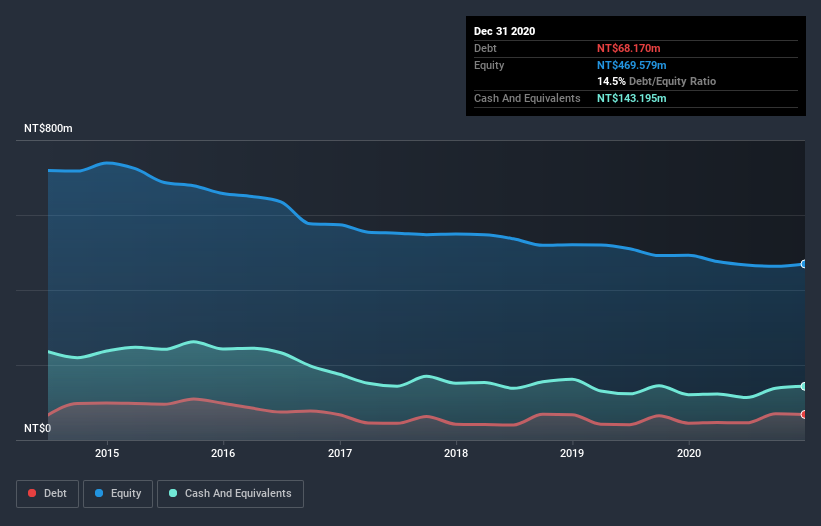David Iben put it well when he said, 'Volatility is not a risk we care about. What we care about is avoiding the permanent loss of capital.' It's only natural to consider a company's balance sheet when you examine how risky it is, since debt is often involved when a business collapses. Importantly, Tittot Company Limited (GTSM:9949) does carry debt. But the real question is whether this debt is making the company risky.
When Is Debt A Problem?
Debt and other liabilities become risky for a business when it cannot easily fulfill those obligations, either with free cash flow or by raising capital at an attractive price. Ultimately, if the company can't fulfill its legal obligations to repay debt, shareholders could walk away with nothing. However, a more frequent (but still costly) occurrence is where a company must issue shares at bargain-basement prices, permanently diluting shareholders, just to shore up its balance sheet. Of course, the upside of debt is that it often represents cheap capital, especially when it replaces dilution in a company with the ability to reinvest at high rates of return. When we examine debt levels, we first consider both cash and debt levels, together.
See our latest analysis for Tittot
What Is Tittot's Debt?
As you can see below, at the end of December 2020, Tittot had NT$68.1m of debt, up from NT$45.0m a year ago. Click the image for more detail. However, it does have NT$143.2m in cash offsetting this, leading to net cash of NT$75.1m.

How Strong Is Tittot's Balance Sheet?
Zooming in on the latest balance sheet data, we can see that Tittot had liabilities of NT$77.6m due within 12 months and liabilities of NT$30.9m due beyond that. Offsetting these obligations, it had cash of NT$143.2m as well as receivables valued at NT$21.7m due within 12 months. So it actually has NT$56.4m more liquid assets than total liabilities.
This short term liquidity is a sign that Tittot could probably pay off its debt with ease, as its balance sheet is far from stretched. Simply put, the fact that Tittot has more cash than debt is arguably a good indication that it can manage its debt safely. When analysing debt levels, the balance sheet is the obvious place to start. But you can't view debt in total isolation; since Tittot will need earnings to service that debt. So if you're keen to discover more about its earnings, it might be worth checking out this graph of its long term earnings trend.
In the last year Tittot had a loss before interest and tax, and actually shrunk its revenue by 29%, to NT$178m. That makes us nervous, to say the least.
So How Risky Is Tittot?
Although Tittot had an earnings before interest and tax (EBIT) loss over the last twelve months, it generated positive free cash flow of NT$2.8m. So although it is loss-making, it doesn't seem to have too much near-term balance sheet risk, keeping in mind the net cash. We'll feel more comfortable with the stock once EBIT is positive, given the lacklustre revenue growth. There's no doubt that we learn most about debt from the balance sheet. However, not all investment risk resides within the balance sheet - far from it. For example - Tittot has 1 warning sign we think you should be aware of.
At the end of the day, it's often better to focus on companies that are free from net debt. You can access our special list of such companies (all with a track record of profit growth). It's free.
When trading Tittot or any other investment, use the platform considered by many to be the Professional's Gateway to the Worlds Market, Interactive Brokers. You get the lowest-cost* trading on stocks, options, futures, forex, bonds and funds worldwide from a single integrated account. Promoted
Valuation is complex, but we're here to simplify it.
Discover if Tittot might be undervalued or overvalued with our detailed analysis, featuring fair value estimates, potential risks, dividends, insider trades, and its financial condition.
Access Free AnalysisThis article by Simply Wall St is general in nature. It does not constitute a recommendation to buy or sell any stock, and does not take account of your objectives, or your financial situation. We aim to bring you long-term focused analysis driven by fundamental data. Note that our analysis may not factor in the latest price-sensitive company announcements or qualitative material. Simply Wall St has no position in any stocks mentioned.
*Interactive Brokers Rated Lowest Cost Broker by StockBrokers.com Annual Online Review 2020
Have feedback on this article? Concerned about the content? Get in touch with us directly. Alternatively, email editorial-team (at) simplywallst.com.
About TPEX:9949
Flawless balance sheet with slight risk.
Market Insights
Community Narratives



